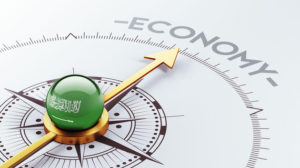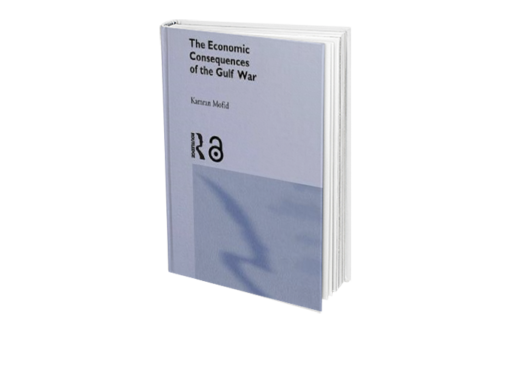
Download PDF: saudi-arabias-economic-time-bomb-by-luay-al-khatteeb
Time is a luxury that Saudi Arabia can no longer take for granted. It faces an economic time bomb, which, if not defused, will have severe and possibly irreversible effects both nationally and internationally. The 2014-2015 collapse in oil prices has slashed the Kingdom’s main source of revenue which makes 77 – to – 88 per cent of its total income. For the last two years, the Saudi government has declared a huge deficit in its budgets, and for the first time since 2007, the Government has been forced to draw on its foreign reserves and issue bonds.
Meanwhile, Saudi Arabia has kept more than 1.5 – 2 million barrels per day of spare capacity on hand for market management. The Kingdom’s current oil production is at 10.3 million barrels per day, including 7.15 for export and 3.15 allocated for local demand. However, domestic consumption is on the rise as per Saudi Aramco’s estimate. It is believed that by 2030, local demand is likely to increase to around 8.2 million barrels per day, whilst several studies conclude that Saudi Arabia could be a net importer of oil before its centennial anniversary in 2032.
However, the Saudis can mitigate their predicament if aggressive reform measures and pragmatic policies are put in place. The King and his policy advisors will need to continually review and update their national priorities to depart from legacy practices by focusing inwards rather than outwards. This mindset must surely be a prerequisite step to any meaningful economic and institutional reforms if the Kingdom is to survive.
Budget Review
According to Saudi Arabia’s Ministry of Finance, the 2016 budget comes amid unprecedented international and regional economic turmoil, namely a global economic slowdown in growth. Current speculations on oil prices rebounding to $50 dollars or above are not realistic for 2016. Even if prices rebound to 2015 average of $49 a barrel, it may not hold for long. Prices are expected to be suppressed by the return of Iranian oil production sometime next year. The Kingdom’s unveiled budget for 2016 predicts a deficit of SR 326 billion ($87 billion). Projected spending is expected to reach 840 billion riyals ($224 billion) and revenue at 513 billion ($137 billion). The largest single allocation in the budget was 213 billion riyals ($56.8 billion) to the military and security services, comprising more than 25 percent of the total – a much higher allocation than that of 2015 budget. The allocation to the military and security services clearly indicate the Kingdom’s prioritises ‘guns over butter’ in terms of consolidating its grip on power despite growing regional tensions.
Actual government expenditure in 2015 reached SR 975 billion ($260 billion), representing an increase of 13 percent of the estimated budgeted spending, and registering a deficit of SR 367 billion ($98 billion). The increase in spending has mainly resulted from the additional salaries for civil and military Saudi employees, beneficiaries of social security and retirees – the ministry stated.
Dwindling Financial Reserves
The rapid depletion of Saudi’s foreign exchange funds is rather alarming. During 2015, the Kingdom’s central bank reserves have dropped from $732 billion to $623 billion in less than 12 months. Based on current levels of spending and deficit, and assuming budget priorities remain static, with oil market conditions to stay unchanged, and regional tensions do not escalate, their reserves give them a fiscal buffer of five years at best.
The 2014-2015 declines in oil prices differ from historic episodes. This time it’s oversupply driven by unprecedented production levels from conventional and non-conventional producers. Advance technologies and unconventional sources of supply to the energy mix have made the competition fierce over market share. To make matters worse, Saudi Arabia will have to compete with aggressive oil production plans projected by Iraq and Iran. This will undoubtedly glut the market with further oversupplies of 3 million barrel a day. If this unsustainable financial decline continues at its present rate, the dollar exchange rate to the riyal will be endangered and the government will not be able to keep the peg. This may have serious ramifications on the U.S. dollar if other Gulf Cooperation Council countries follow suit.
Annual subsidies on oil and gas are costing the Kingdom around $61 billion and nearly $10 billion for electricity and water. As a result of current fiscal reforms enacted by the government, they have now increased rates on natural gas to +66%, ethane +133%, and gasoline +50%. Although this could be seen as a massive increase in prices by local consumers, the increases remain relatively low compared to international markets. This slight increase in prices which is being replicated across the GCC, is seen more as an austerity package alongside increase in taxes than strictly adhering to the International Monetary Fund recommendations. The impact of such measures are yet to be clearly tested and assessed in terms of local acceptance but provided the local cost of goods and services remain stable, job creation for locals in the public sector increases and welfare benefits remain as they are, citizens of KSA are unlikely to put pressure on the Government.
As for defence spending, the 2016 budget has featured the largest single allocation in the budget at 213 billion riyals ($56.79 billion) to the military and security services, comprising more than 25 percent of the total budget. According to IHS, Saudi defence could reach as much as $62bn by 2020, in part due to KSA’s military interventions in the region. It is worth noting Riyadh’s defence budget had been rising by 19 per cent a year since the Arab uprisings of 2011 which clearly reflects the growing domestic and regional pressures felt by the authorities.
Furthermore, budgeted allocations may not necessarily include off balance sheet financial commitments allocated to countries that opted to join Saudi Arabia’s military coalitions and campaigns in the Middle East.
The Ticking Time Bomb
Sharp decline in oil prices, cost of subsidies and military spending, including the war in Yemen and supporting rebels in Syria, are all factors that will continue impacting the Kingdom’s financial position. However, the ‘mother of all problems’ facing the nation is not a growing budget deficit, regional terrorism and sectarian tensions but the growing and endemic youth unemployment that continues to endanger Saudi Arabia’s national security. Saudi Arabia needs to increase public-private sector cooperation to absorb millions of unemployed youth and avoid rendering them to the abyss of terrorism or civil unrest.
Despite the Kingdom’s 23 per cent budget allocation to education and training, SR 191.6 billion ($51 billion), Saudi Arabia’s youth unemployment is now the biggest socio-economic challenge that is crippling if not seriously undermine the Government’s hold on power.
Two-thirds of the Saudi population – of 30.8 million – are under the age of 30. According to official statistics, the unemployment rate for Saudis aged 15 to 24 is 30 percent. A published paper by the Woodrow Wilson International Center for Scholars in 2011 suggests that thirty-seven percent of all Saudis are 14-years-old or younger! Saudi Arabia needs to create at least 3 million new jobs by 2020.
The Saudi government will also need to release immense pent up social pressure by adopting genuine grass root policies adhering to democracy and human rights principles under international laws and conventions. It should not be forgotten that Government’s accountability and protection should be truly expressed to the 10 million expat community living in the Kingdom including children born to Saudi mothers but foreign fathers. For example, children who are born to Saudi mothers despite being entitled to education at primary, secondary and undergraduate levels and have a right to work are not citizens with unqualified rights of residency or state pensions, unlike children born to Saudi fathers.
Austerity for The Kingdom
The success or failure of the 2016 budget plan will be key to maintaining the confidence of the financial markets in Riyadh. But in light of ongoing budget shortfalls, slow reform and current rates of spending, the Kingdom may have less than five years to deplete its foreign currency reserves according to the IMF. Therefore, Saudi Arabia must act fast and smart by starting to gradually cut down on their subsidies, reduce superfluous spending on defense and start privatizing selected state-owned entities to generate cash and crucially create employment opportunities for its youth which represents either the greatest threat or beneficiary of such budget plans and related policies.
Ways to defuse the Kingdom’s time bomb
For the Kingdom to survive its centennial anniversary, it should adapt to an emerging new Middle East where regional politics and social order have changed dramatically over the past decade. Moreover, the government should look into skills based educational system, job creation methods that cater for the competitive private sector, a merit based approach to the welfare system and a gradual departure from the rentier model are sure ways to safeguard the Kingdom’s future.
Silver lining to the Kingdom’s Grey Cloud
It is important to note that despite the 2016 austerity budget, the search for natural gas remains a priority for Saudi Arabia and inspired by its shale competitors in the US, the Kingdom has undertaken several appraisals of unconventional gas potential in its Eastern Province, north western province and Empty Quarter. Saudi officials estimate producing 4 billion cubic feet per day by 2025.
Furthermore according to the World Nuclear Association in a report published in September 2015, Saudi Arabia plans to construct 16 nuclear power reactors over the next 20 years at a cost of more than $80 billion, with the first reactor on line in 2022. It projects 17 GWe of nuclear capacity by 2040 to provide 15 per cent of the power then, along with over 40 GWe of solar capacity.
The Kingdom together with other GCC members would appear to have reached consensus on the GCC wide implementation of a Value Added Tax law probably within the next year or so designed to increase Government revenue and reduce their fiscal deficit. The IMF has advised on a starting rate of 5 per cent but this has yet to be determined as this article goes to print. There are even serious discussions on corporate income tax which may become inevitable with the passage of time.
The cumulative effect of VAT together with income tax may force a sizeable number of relatively well paid western expatriates to leave the country and opt for other jurisdictions such as Singapore. For professionals or seasonal workers hailing from developing countries, the option for staying in the Kingdom with rising costs of living may not be sustainable unless the government reforms labour laws thereby leveling the playing field between employer and employee.
The Way Forward
The Kingdom is taking slow but positive steps to diversify its energy mix and revenue sources away from the rentier model for reasons of survival. However the real economic multiplier will be in legislating genuine reform to integrate its unemployed youth in becoming the drivers as opposed to the beneficiaries of the Kingdom’s economy.
Neglecting the effective integration of Saudi youth in the public sector and more importantly private sector may further radicalize the disenfranchised youth which will ultimately threaten national security or encouraging them to join radical groups which may destabilize the region further.
Putting external affairs above the Kingdom’s domestic priorities; paying lip service to political, social and institutional reforms; financing rebel groups; burning through currency reserves on military expedition and ignoring future generations’ needs, are all, the very things that Saudi Arabia must not continue doing. Riyadh needs to undergo a C-change in mindset if it is to step back from the abyss that awaits. The winds of change can no longer be ignored by Riyadh.
(*) Iraqi Energy Expert and Director of the Iraq Energy Institute
Source: Huffingtonpost, 30 December 2015
http://www.huffingtonpost.com/luay-al-khatteeb/saudi-arabias-economic-ti_b_8894100.html








Comment here